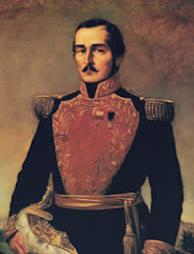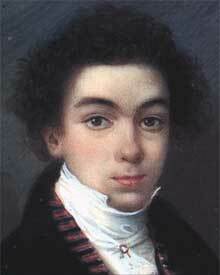|
Mercedes Abrego
Mercedes Abrego de Reyes (died 1813) was a heroine of the Colombian independence movement. She was born and raised in Cúcuta. She was married off to José Marcelo Reyes at a very young age. They had three sons, and her husband died a few years later. Life When the war of independence began, Abrego gave her enthusiastic support to the freedom fighters. She was a fervent admirer of Simón Bolívar, whom she came to know during the latter's military campaigns in Cúcuta. Abrego actively worked with the patriotic armies which were fighting in the Cucuta valley against the Spanish colonial forces of Ramón Correa and Bartolomé Lizón. When Bolívar was organizing his troops for the Admirable Campaign of 1813, Abrego presented him with a coat embroidered in gold and sequins that she had made herself. Through her numerous contacts, she maintained secret communications with General Francisco de Paula Santander Francisco José de Paula Santander y Omaña (Villa del Rosario, N ... [...More Info...] [...Related Items...] OR: [Wikipedia] [Google] [Baidu] |
Colombia
Colombia (, ; ), officially the Republic of Colombia, is a country in South America with insular regions in North America—near Nicaragua's Caribbean coast—as well as in the Pacific Ocean. The Colombian mainland is bordered by the Caribbean Sea to the north, Venezuela to the east and northeast, Brazil to the southeast, Ecuador and Peru to the south and southwest, the Pacific Ocean to the west, and Panama to the northwest. Colombia is divided into 32 departments and the Capital District of Bogotá, the country's largest city. It covers an area of 1,141,748 square kilometers (440,831 sq mi), and has a population of 52 million. Colombia's cultural heritage—including language, religion, cuisine, and art—reflects its history as a Spanish colony, fusing cultural elements brought by immigration from Europe and the Middle East, with those brought by enslaved Africans, as well as with those of the various Amerindian civilizations that predate colonization. Spanish is th ... [...More Info...] [...Related Items...] OR: [Wikipedia] [Google] [Baidu] |
Cúcuta
Cúcuta (), officially San José de Cúcuta, is a Colombian municipality, capital of the department of Norte de Santander and nucleus of the Metropolitan Area of Cúcuta. The city is located in the homonymous valley, at the foot of the Eastern Ranges of the Colombian Andes, on the border with Venezuela. It comprises an area of approximately 1119 km2, with an urban area of 64 km2 (divided into 10 communes) and a rural area of 1055 km2 (divided into 10 townships). The city has a population of 777,106 inhabitants, which makes it the most populous municipality in the department and the sixth most populous municipality in the country. Similarly, its metropolitan area (made up of the municipalities of Villa del Rosario, Los Patios, El Zulia, San Cayetano and Puerto Santander) has an approximate population of 1,046,347. The city was founded as a parish on June 17, 1733, by Juana Rangel de Cuéllar, resident of Pamplona in the area under the name of ''San José de Guasimales'', as ... [...More Info...] [...Related Items...] OR: [Wikipedia] [Google] [Baidu] |
Simón Bolívar
Simón José Antonio de la Santísima Trinidad Bolívar y Palacios (24 July 1783 – 17 December 1830) was a Venezuelan military and political leader who led what are currently the countries of Colombia, Venezuela, Ecuador, Peru, Panama and Bolivia to independence from the Spanish Empire. He is known colloquially as '' El Libertador'', or the ''Liberator of America''. Simón Bolívar was born in Caracas in the Captaincy General of Venezuela into a wealthy criollo family. Before he turned ten, he lost both parents and lived in several households. Bolívar was educated abroad and lived in Spain, as was common for men of upper-class families in his day. While living in Madrid from 1800 to 1802, he was introduced to Enlightenment philosophy and met his future wife María Teresa Rodríguez del Toro y Alaysa. After returning to Venezuela, in 1803 del Toro contracted yellow fever and died. From 1803 to 1805, Bolívar embarked on a grand tour that ended in Rome, where he swore to end ... [...More Info...] [...Related Items...] OR: [Wikipedia] [Google] [Baidu] |
Ramón Correa
Ramón or Ramon may refer to: People Given name *Ramon (footballer, born 1998), Brazilian footballer *Ramón (footballer, born 1990), Brazilian footballer *Ramón (singer), Spanish singer who represented Spain in the 2004 Eurovision Song Contest *Ramón Blanco y Erenas (1833–1906), Spanish brigadier and colonial administrator of the Philippines *Ramón Castillo (1873-1944), former Argentinian president * Ramon Dekkers, Dutch muay thai fighter *Ramón del Valle-Inclán (1866–1936), Spanish dramatist and novelist * Ramón Díaz, Argentine football player and coach *Ramón H. Dovalina (born 1943), American educator * Ramón Emeterio Betances (1827–1898), Puerto Rican nationalist *Ramón Arellano Félix (1964–2002), Mexican drug lord and fugitive *Ramón Fumadó (born 1981), Venezuelan diver *Ramón Fernando García (born 1972), Colombian road cyclist *Ramón Gerardo Antonio Estévez (born 1940), American actor, using the stage name Martin Sheen *Ramón González (athlete) (bor ... [...More Info...] [...Related Items...] OR: [Wikipedia] [Google] [Baidu] |
Bartolomé Lizón
Bartolomé may refer to: Places * Bartolomé Island (Spanish: Isla Bartolomé), a volcanic islet in the Galápagos Islands Group * Isla Bartolomé, Diego Ramirez Islands, Chile People * Bartolomé Bermejo (c.1440–c.1501), Spanish painter * Bartolomé Esteban Murillo (1618–1682), Spanish painter * Bartolomé de Escobedo (1500–1563), Spanish composer * Bartolomé de las Casas (1484–1566), Spanish priest * Bartolomé de Medina, (149?–15??), Spanish metallurgist * Bartolomé de Medina, (1527–1581), Spanish theologian See also * Bartholomew (other) Bartholomew the Apostle was one of the twelve Apostles of Jesus. Bartholomew may also refer to: * Bartholomew (name), a given name and family name * Bartholomew I of Constantinople, Ecumenical Patriarch of Constantinople * Bayou Bartholomew, a ba ... {{Disambig, geo, surname Spanish masculine given names ... [...More Info...] [...Related Items...] OR: [Wikipedia] [Google] [Baidu] |
Admirable Campaign
The Admirable Campaign () was a military action led by Simón Bolívar in which the provinces of Mérida, Barinas, Trujillo and Caracas were conquered by the Patriots.Arana, M., 2013, Bolivar, New York: Simon & Schuster, Its objective was to free Venezuela from Spanish control, which was accomplished in conjunction with Santiago Mariño's simultaneous campaign in the east. Overview After the loss of the First Republic of Venezuela, Bolívar had gone to New Granada where he joined the army of the United Provinces, which was in the process of fighting with cities that did not recognize its authority. On January 28, 1813 Bolívar captured Ocaña, a city which was on the main roads to Venezuela. The expedition was formed by two divisions, a vanguard led by Colonel Atanasio Girardot and a rear under Colonel José Félix Ribas. At the same time Domingo de Monteverde was moving troops to western Venezuela in preparation for an invasion of New Granada, threatening the newly independen ... [...More Info...] [...Related Items...] OR: [Wikipedia] [Google] [Baidu] |
Francisco De Paula Santander
Francisco José de Paula Santander y Omaña (Villa del Rosario, Norte de Santander, Colombia, April 2, 1792 – Santafé de Bogotá, Colombia, May 6, 1840), was a Colombian military and political leader during the 1810–1819 independence war of the United Provinces of New Granada (present-day Colombia). He was the acting President of Gran Colombia between 1819 and 1826, and later elected by Congress as the President of the Republic of New Granada between 1832 and 1837. Santander came to be known as "The Man of the Laws" (''"El Hombre de las Leyes"'').Arismendi Posada, Ignacio; ''Gobernantes Colombianos''; trans. Colombian Presidents; Interprint Editors Ltd.; Italgraf; Segunda Edición; Page 21; Bogotá, Colombia; 1983 Biography Santander was born in Villa del Rosario, not far from Cúcuta, on April 2, 1792. His parents were Juan Agustín Santander Colmenares who was governor of the rural province of San Faustino de los Ríos as well as a cocoa grower, and his mother; ... [...More Info...] [...Related Items...] OR: [Wikipedia] [Google] [Baidu] |
Colombian Revolutionaries
Colombian may refer to: * Something of, from, or related to the country of Colombia * Colombians, persons from Colombia, or of Colombian descent **For more information about the Colombian people, see: *** Demographics of Colombia *** Indigenous peoples in Colombia, Native Colombians *** Colombian American ** For specific persons, see List of Colombians * Colombian Spanish, one of the languages spoken in Colombia ** See also languages of Colombia * Colombian culture * Colombian sheep, a sheep breed See also * * * Christopher Columbus (1451–1506), Italian explorer after which Colombia was named * Coffee production in Colombia * Colombia (other) * Colombiana (other) * Colombina (other) * Colombino (other) * Colombine (other) * Columbia (other) * Columbiad (other) * Columbian (other) * Columbiana (other) * Columbine (other) * Columbina (other) Columbina is a stock charac ... [...More Info...] [...Related Items...] OR: [Wikipedia] [Google] [Baidu] |
19th-century Colombian People
The 19th (nineteenth) century began on 1 January 1801 ( MDCCCI), and ended on 31 December 1900 ( MCM). The 19th century was the ninth century of the 2nd millennium. The 19th century was characterized by vast social upheaval. Slavery was abolished in much of Europe and the Americas. The First Industrial Revolution, though it began in the late 18th century, expanding beyond its British homeland for the first time during this century, particularly remaking the economies and societies of the Low Countries, the Rhineland, Northern Italy, and the Northeastern United States. A few decades later, the Second Industrial Revolution led to ever more massive urbanization and much higher levels of productivity, profit, and prosperity, a pattern that continued into the 20th century. The Islamic gunpowder empires fell into decline and European imperialism brought much of South Asia, Southeast Asia, and almost all of Africa under colonial rule. It was also marked by the collapse of the large S ... [...More Info...] [...Related Items...] OR: [Wikipedia] [Google] [Baidu] |
19th-century Colombian Women
The 19th (nineteenth) century began on 1 January 1801 (Roman numerals, MDCCCI), and ended on 31 December 1900 (Roman numerals, MCM). The 19th century was the ninth century of the 2nd millennium. The 19th century was characterized by vast social upheaval. Slavery was abolitionism, abolished in much of Europe and the Americas. The Industrial Revolution, First Industrial Revolution, though it began in the late 18th century, expanding beyond its British homeland for the first time during this century, particularly remaking the economies and societies of the Low Countries, the Rhineland, Northern Italy, and the Northeastern United States. A few decades later, the Second Industrial Revolution led to ever more massive urbanization and much higher levels of productivity, profit, and prosperity, a pattern that continued into the 20th century. The Gunpowder empires, Islamic gunpowder empires fell into decline and European imperialism brought much of South Asia, Southeast Asia, and almost ... [...More Info...] [...Related Items...] OR: [Wikipedia] [Google] [Baidu] |
1813 Deaths
Events January–March * January 18–January 23 – War of 1812: The Battle of Frenchtown is fought in modern-day Monroe, Michigan between the United States and a British and Native American alliance. * January 24 – The Philharmonic Society (later the Royal Philharmonic Society) is founded in London. * January 28 – Jane Austen's '' Pride and Prejudice'' is published anonymously in London. * January 31 – The Assembly of the Year XIII is inaugurated in Buenos Aires. * February – War of 1812 in North America: General William Henry Harrison sends out an expedition to burn the British vessels at Fort Malden by going across Lake Erie via the Bass Islands in sleighs, but the ice is not hard enough, and the expedition returns. * February 3 – Argentine War of Independence: José de San Martín and his Regiment of Mounted Grenadiers gain a largely symbolic victory against a Spanish royalist army in the Battle of San Lorenzo. * February ... [...More Info...] [...Related Items...] OR: [Wikipedia] [Google] [Baidu] |





